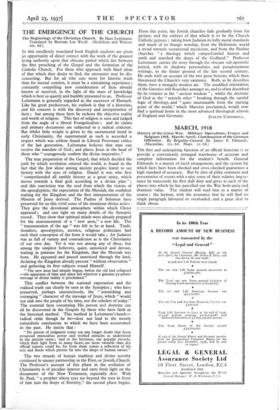THE EMERGENCE OF THE CHURCH
The Beginnings of the Christian Church. By Hans Leitzmann. Translated by Bertram Lee Woolf. (Nicholson and Watson. los. 6d.)
IN this excellently translated book English students are given an opportunity of direct contact with the work of the greatest
living authority upon that obscure period which lies between the first preaching of the Gospel and the formation of the Catholic Church. For those who approach with fixed ideas of that which they desire to find, the encounter may be dis- concerting. But for all who care more for historic truth than for mental comfort, it must be a stimulating experience ; constantly compelling new consideration of facts already known or received, in the light of the mass of knowledge which is here so quietly and humbly presented to us. Professor Leitzmann is generally regarded as the successor of Harnack. Like his great predecessor, his outlook is that of a historian, and his concern is with the discovery and interpretation of
facts ; but among these facts he reckons the objective reality and worth of religion. This fact of religion is seen and judged from the angle of a liberal Evangelicalism ; and its claims
and primary documents are subjected to a radical criticism. But whilst little weight is given to the sacramental trend in early Christianity, the supernatural as such is accorded a respect which was seldom found in Liberal Protestant critics of the last generation. Leitzmann believes that man can receive the mandate of God ; and places Jesus at the head of those who " courageously confirm the divine imperative."
The true preparation of the Gospel, that which decided the path by which revelation entered the world, is found in the fact that the Jew alone among ancient peoples learnt to see history with the eyes of religion. Daniel it was who first "comprehended all earthly history as a great unity, which moves towards a final goal according to a divine plan " ; and this conviction was the seed from which the visions of the apocalyptists, the expectation of the Messiah, the confident waiting for the Kingdom and the first interpretations of the Mission of Jesus derived. The Psalms of Solomon have preserved for us this vivid sense of the imminent divine acticp. They give the devotional atmosphere within which Christ appeared ; and cast light on many details of the Synoptic record. They show that spiritual minds were already prepared for the announcement of a " new aeon," a new life. The " transmutation of the age " was felt to be at hand. Tradi- tionalists, apocalyptists, ascetics, religious politicians had each their conception of the form it would take ; for Judaism was as full of variety and contradiction as is the Christianity of our own day. Yet it was not among any of these, but among the simplest believers, quiet, unnoticed and devout, waiting in patience for the Kingdom, that the Messiah was born. He appeared and passed unnoticed through the land, declaring the Kingdom already present " without observation " and gathering its first subjects round Himself.
" The new aeon had already begun, before the old had collapsed —the apparatus of time and space fail wherever a genuine prophetic message of divine reality is proclaimed."
This conflict between the national expectation and the
realised truth can clearly be seen in the Synoptics ; who have preserved, perhaps unconsciously, the " astonishing and estranging " character of the message of Jesus, which " would
not sink into the people of his time, nor the scholars of today." The essential facts concerning His person and doctrine can all be discovered in the Gospels by those who have faith in the historical method. This method in Leitzmann's hands— radical critic though he be—does not lead to the merely naturalistic conclusions to which we have been accustomed
in the past. He insists that :
" No person of judgment today can any longer doubt that Jesus possessed miraculous power and worked miracles as understood in the ancient sense ; and to the historian, our popular records, which flash light from so many facets, are more valuable than dry official reports could be, for from them comes a reflection of his acts and deeds which pierces far into the deeps of human nature."
The two strands of human tradition and divine novelty continued in uneasy partnership in the First, or Jewish, Church. The Professor's account of this phase in the evolution of Christianity is of peculiar interest and casts fresh light on the documents of the New Testament, especially Acts. With St. Paul, " a prophet whose eyes see beyond the men in front
of him -into the deeps of Eternity," the second phase begins. From this point, the Jewish churches fade gradually from the picture, and the embryo of that which is to be the Church Catholic appears ; taking from Judaism its lofty moral standards and much of its liturgic worship, from the Hellenistic world a trend towards sacramental mysticism, and from the Pauline churches " a theology which comprehended heaven and earth and searched the deeps of the Godhead." Professor Leitzmann carries the story through the obscure sub-apostolic period, with its shadowy personalities and pseudonymous writings, to the firmer ground of the late second century. He ends with an account of the two great heresies which then threatened the Church's very existence. Both, as he describes them, have a strangely modern air. The muddled oricntalism of the Gnostics still flourishes amongst us, and is often described by its votaries as the " ancient wisdom " ; whilst the doctrine of God as the " entirely other " breaking through the careful logic of theology, and " quite unattainable from the starting point of the world," which Marcion proclaimed, would now find a spiritual home in the most advanced theological schools










































 Previous page
Previous page